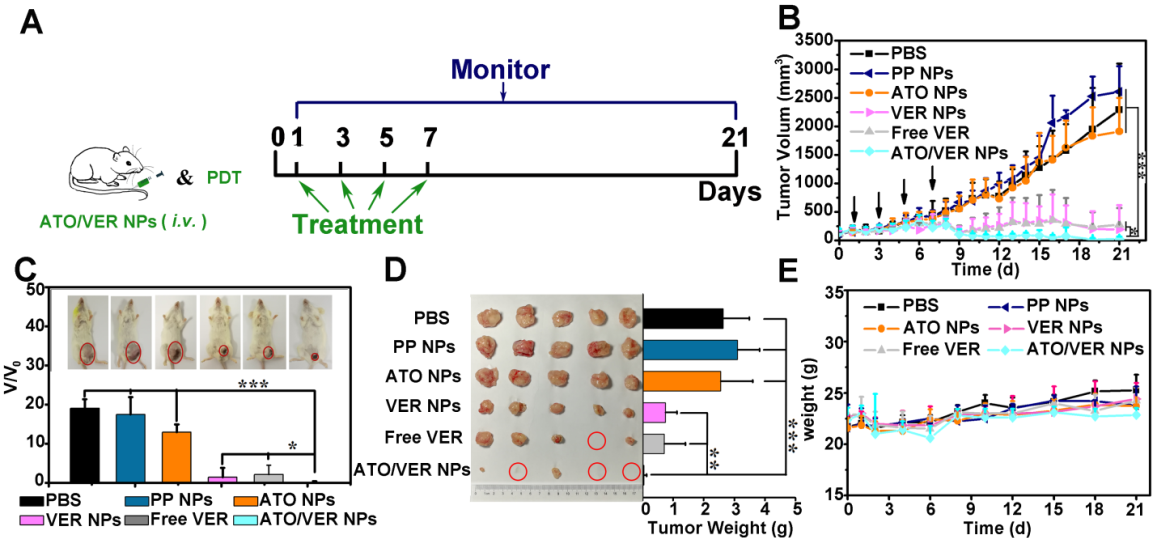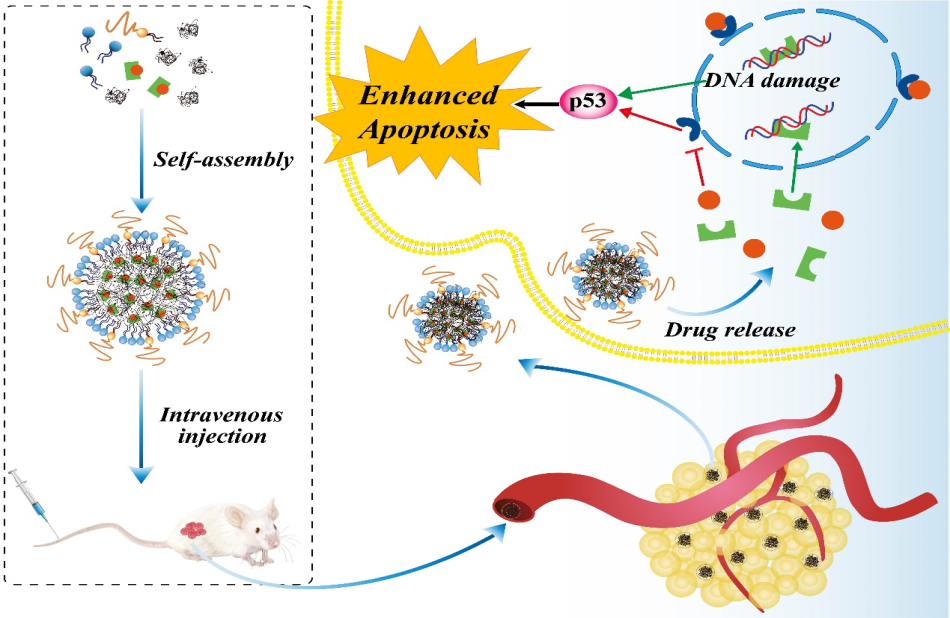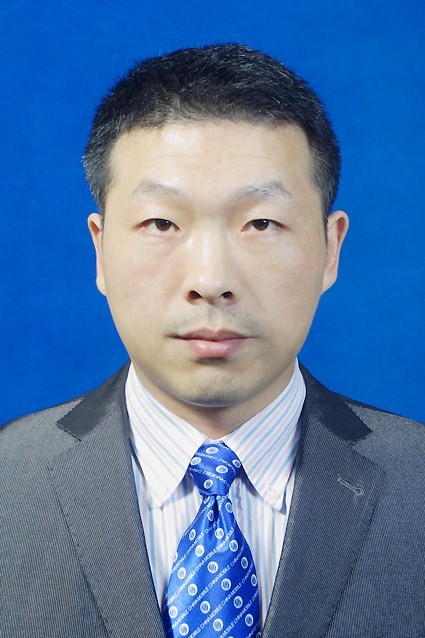1. Research Projects
(1) National Natural Science Foundation of China project, 82073398, 2021.1-2024.12, 550,000 yuan.
(2) The Key project of the Central University Foundation, 2632018ZD12, 2018.01- 2019.12, 150,000 yuan.
(3) National Natural Science Foundation of China Youth Foundation, 21301191, 2014.01-2016.12, 250,000 yuan.
(4) Jiangsu Provincial Natural Science Youth Foundation, BK20130661, 2013.07-2016.06, 200,000 yuan.
2. Academic Awards
(1) 2022/12, The second prize of Scientific Research Outstanding Achievement Award (Science and Technology) of Higher Education Ministry, 8/11
(2) 2020/12, 2020 Shimazu Young Scholars Award
3. Representative Research Achievements
(1) Oxygen plays an important role in photodynamic therapy (PDT) for tumor. However, hypoxia within the tumor severely impaired the therapeutic effect of PDT. To solve this problem, a sub-50 nm dual-loaded nanoparticle was designed and prepared to improve PDT efficiency by cutting off the oxygen consumption pathway. This work is different from the traditional direct oxygen delivery strategy, and the indirect suppression of tumor oxygen consumption strategy was used in anti-tumor sensitization therapy, which opens up a new method of photodynamic therapy.

(2) Cisplatin is one of the commonly used chemotherapy drugs, but drug resistance and side effects limit its clinical application. Based on this, this study developed strategies to improve the tumor inflammatory microenvironment to overcome the side effects caused by the use of a single Cisplatin. However, due to different drug properties will bring about different in vivo dynamics will lead to reduced efficacy. Herein, platinum (II) prodrugs were designed to enhance the treatment strategy of breast cancer. Based on the two-in-one co-delivery strategy, a bi-functional platinum (II) prodrug nanodelivery system was developed to enhance the treatment of breast cancer and significantly extend the survival time of tumor-bearing mice. This study reported for the first time a new type of anti-inflammatory bifunctional platinum drug, which laid a good foundation for the development and clinical application of chemotherapy drugs.

1. Study on pharmaceutical polymer materials and targeted drug release system
2. Study and development and industrialization of micro/nano preparations
3. Study on metal drug delivery system
4. Gene drug drug delivery system
1. Research Projects
(1) National Natural Science Foundation of China project, 82073398, 2021.1-2024.12, 550,000 yuan.
(2) The Key project of the Central University Foundation, 2632018ZD12, 2018.01- 2019.12, 150,000 yuan.
(3) National Natural Science Foundation of China Youth Foundation, 21301191, 2014.01-2016.12, 250,000 yuan.
(4) Jiangsu Provincial Natural Science Youth Foundation, BK20130661, 2013.07-2016.06, 200,000 yuan.
2. Academic Awards
(1) 2022/12, The second prize of Scientific Research Outstanding Achievement Award (Science and Technology) of Higher Education Ministry, 8/11
(2) 2020/12, 2020 Shimazu Young Scholars Award
3. Representative Research Achievements
(1) Oxygen plays an important role in photodynamic therapy (PDT) for tumor. However, hypoxia within the tumor severely impaired the therapeutic effect of PDT. To solve this problem, a sub-50 nm dual-loaded nanoparticle was designed and prepared to improve PDT efficiency by cutting off the oxygen consumption pathway. This work is different from the traditional direct oxygen delivery strategy, and the indirect suppression of tumor oxygen consumption strategy was used in anti-tumor sensitization therapy, which opens up a new method of photodynamic therapy.

(2) Cisplatin is one of the commonly used chemotherapy drugs, but drug resistance and side effects limit its clinical application. Based on this, this study developed strategies to improve the tumor inflammatory microenvironment to overcome the side effects caused by the use of a single Cisplatin. However, due to different drug properties will bring about different in vivo dynamics will lead to reduced efficacy. Herein, platinum (II) prodrugs were designed to enhance the treatment strategy of breast cancer. Based on the two-in-one co-delivery strategy, a bi-functional platinum (II) prodrug nanodelivery system was developed to enhance the treatment of breast cancer and significantly extend the survival time of tumor-bearing mice. This study reported for the first time a new type of anti-inflammatory bifunctional platinum drug, which laid a good foundation for the development and clinical application of chemotherapy drugs.

1.Wang, Y.#; Hu, L.F.#; Cui, P.F.#; Qi, L.Y.; Xing. L.*; Jiang, H.L.* Pathologically responsive mitochondrial gene therapy in an allotopic expression-independent manner cures Leber’s hereditary optic neuropathy. Adv Mater. 2021;33:2103307. (IF: 30.849)
2.Xing, L.#; Liu, X.Y.#; Zhou, T.J.#; Wan, X.; Wang, Y.; Jiang, H.L.* Photothermal nanozyme-ignited Fenton reaction-independent ferroptosis for breast cancer therapy. J Control Release. 2021;339:14-26. (IF: 9.776)
3.Xing, L.#; Yang, C.X.#; Zhao, D.; Shen, L.J.; Zhou, T.J.; Bi, Y.Y.; Huang, Z.J.; Wei, Q.; Li, L.*; Li, F.*; Jiang, H.L.* A carrier-free anti-inflammatory platinum (II) self-delivered nanoprodrug for enhanced breast cancer therapy. J Control Release. 2021;331:460-471. (IF: 9.776)
4.Chang, X.#; Xing, L.#; Wang, Y.#; Yang, C.X.; He, Y.J.; Zhou, T.J.; Gao, X.D.; Li. L.; Hao. H.P.*; Jiang, H.L.* Monocyte-derived multipotent cell delivered programmed therapeutics to reverse idiopathic pulmonary fibrosis. Sci Adv. 2020;6:eaba3167. (IF: 13.116)
5.Xing, L.#; Gong, J.H.#; Wang, Y.; Zhu, Y.; Huang, Z.J.; Zhao, J.; Li, F.; Wang, J.H.*; Wen, H.*; Jiang, H.L.* Hypoxia alleviation-triggered enhanced photodynamic therapy in combination with IDO inhibitor for preferable cancer therapy. Biomaterials. 2019;206:170-182. (IF: 10.273)
6.Fan, Y.T.#; Zhou, T.J.#; Cui, P.F.; He, Y.J.; Chang, X.; Xing, L.*; Jiang, H.L.* Modulation of intracellular oxygen pressure by dual-drug nanoparticles to enhance photodynamic therapy. Adv Funct Mater. 2019;29:1806708. (IF: 15.621)



